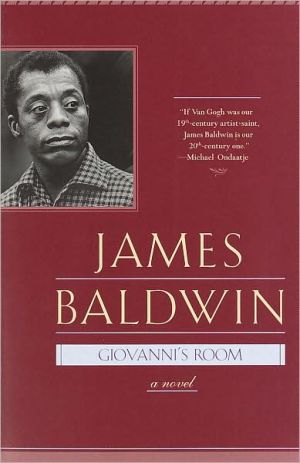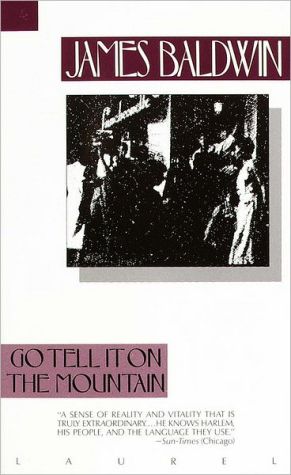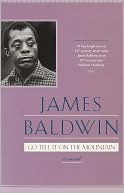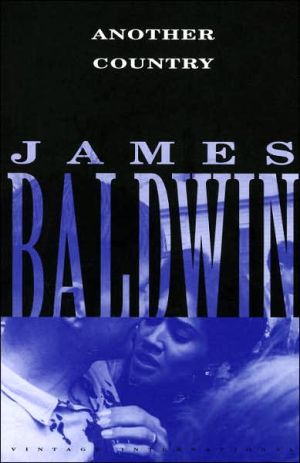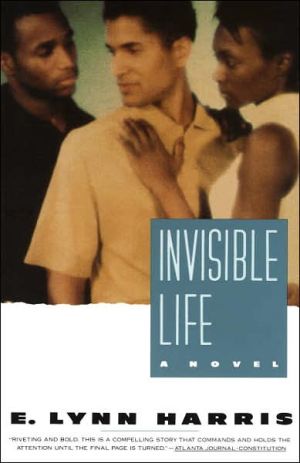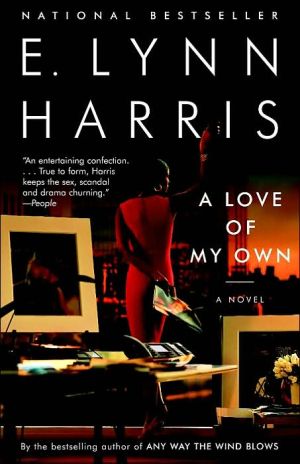Giovanni's Room
"Giovanni's Room traces one man's struggle with his sexual identity. In a 1950s Paris swarming with expatriates and characterized by dangerous liaisons and hidden violence, an American finds himself confronting secret desires that jeopardize the conventional life he envisions for himself. After meeting and proposing to a young woman, he falls into a lengthy affair with an Italian bartender and is confounded and tortured as he oscillates between the two." "Now a classic of gay literature,...
Search in google:
Set in the 1950s Paris of American expatriates, liaisons, and violence, a young man finds himself caught between desire and conventional morality. With a sharp, probing imagination, James Baldwin's now-classic narrative delves into the mystery of loving and creates a moving, highly controversial story of death and passion that reveals the unspoken complexities of the human heart.Library JournalBaldwin's 1956 novel, his second, was daring for its time, depicting a young man deep into Paris's second expatriate movement following World War II as he grapples with his sexual identity. He is drawn both to his fianc e and to a male Italian bartender with whom he begins an affair. Copyright 2001 Cahners Business Information.
I met Giovanni during my second year in Paris, when I had no money. On the morning of the evening that we met I had been turned out of my room. I did not owe an awful lot of money, only around six thousand francs, but Parisian hotel-keepers have a way of smelling poverty and then they do what anybody does who is aware of a bad smell; they throw whatever stinks outside.\ \ My father had money in his account which belonged to me but he was very reluctant to send it because he wanted me to come home — to come home, as he said, and settle down, and whenever he said that I thought of the sediment at the bottom of a stagnant pond. I did not, then, know many people in Paris and Hella was in Spain. Most of the people I knew in Paris were, as Parisians sometimes put it, of le milieu and, while this milieu was certainly anxious enough to claim me, I was intent on proving, to them and to myself, that I was not of their company. I did this by being in their company a great deal and manifesting toward all of them a tolerance which placed me, I believed, above suspicion. I had written to friends for money, of course, but the Atlantic Ocean is deep and wide and money doesn't hurry from the other side.\ \ So I went through my address book, sitting over a tepid coffee in a boulevard cafe, and decided to call up an old acquaintance who was always asking me to call, an aging, Belgian-born, American businessman named Jacques. He had a big, comfortable apartment and lots of things to drink and lots of money. He was, as I knew he would be, surprised to hear from me and before the surprise and the charm wore off, giving him time to become wary, he had invited me for supper. He may havebeen cursing as he hung up, and reaching for his wallet, but it was too late. Jacques is not too bad. Perhaps he is a fool and a coward but almost everybody is one or the other and most people are both. In some ways I liked him. He was silly but he was so lonely; anyway, I understand now that the contempt I felt for him involved my self-contempt. He could be unbelievably generous, he could be unspeakably stingy. Though he wanted to trust everybody, he was incapable of trusting a living soul; to make up for this, he threw his money away on people; inevitably, then, he was abused. Then he buttoned his wallet, locked his door, and retired into that strong self-pity which was, perhaps, the only thing he had which really belonged to him. I thought for a long while that he, with his big apartment, his well-meant promises, his whiskey, his marijuana, his orgies, had helped to kill Giovanni. As, indeed, perhaps he had. But Jacques' hands are certainly no bloodier than mine.\ \ I saw Jacques, as a matter of fact, just after Giovanni was sentenced. He was sitting bundled up in his greatcoat on the terrace of a cafe, drinking a vin chaud. He was alone on the terrace. He called me as I passed.\ \ He did not look well, his face was mottled, his eyes, behind his glasses, were like the eyes of a dying man who looks everywhere for healing.\ \ "You've heard," he whispered, as I joined him, "about Giovanni?"\ \ I nodded yes. I remember the winter sun was shining and I felt as cold and distant as the sun.\ \ "It's terrible, terrible, terrible," Jacques moaned. "Terrible."\ \ "Yes," I said. I could not say anything more.\ \ "I wonder why he did it," Jacques pursued, "why he didn't ask his friends to help him." He looked at me. We both knew that the last time Giovanni had asked Jacques for money, Jacques had refused. I said nothing. "They say he had started taking opium," Jacques said, "that he needed the money for opium. Did you hear that?"\ \ I had heard it. It was a newspaper speculation which, however, I had reasons of my own for believing, remembering the extent of Giovanni's desperation, knowing how far this terror, which was so vast that it had simply become a void, had driven him. "Me, I want to escape," he had told me, "Je veux m'evader — this dirty world, this dirty body. I never wish to make love again with anything more than the body."\ \ Jacques waited for me to answer. I stared out into the street. I was beginning to think of Giovanni dying — where Giovanni had been there would be nothing, nothing forever.\ \ "I hope it's not my fault," Jacques said at last. "I didn't give him the money. If I'd known — I would have given him everything I had."\ \ But we both knew this was not true.\ \ "You two together," Jacques suggested, "you weren't happy together?"\ \ "No," I said. I stood up. "It might have been better," I said, "if he'd stayed down there in that village of his in Italy and planted his olive trees and had a lot of children and beaten his wife. He used to love to sing," I remembered suddenly, "maybe he could have stayed down there and sung his life away and died in bed."\ \ Then Jacques said something that surprised me. People are full of surprises, even for themselves, if they have been stirred enough. "Nobody can stay in the garden of Eden," Jacques said. And then: "I wonder why."\ \ I said nothing. I said goodbye and left him. Hella had long since returned from Spain and we were already arranging to rent this house and I had a date to meet her.\ \ I have thought about Jacques' question since. The question is banal but one of the real troubles with living is that living is so banal. Everyone, after all, goes the same dark road — and the road has a trick of being most dark, most treacherous, when it seems most bright — and it's true that nobody stays in the garden of Eden. Jacques' garden was not the same as Giovanni's, of course. Jacques' garden was involved with football players and Giovanni's was involved with maidens — but that seems to have made so little difference. Perhaps everybody has a garden of Eden, I don't know; but they have scarcely seen their garden before they see the flaming sword. Then, perhaps, life only offers the choice of remembering the garden or forgetting it. Either, or: it takes strength to remember, it takes another kind of strength to forget, it takes a hero to do both. People who remember court madness through pain, the pain of the perpetually recurring death of their innocence; people who forget court another kind of madness, the madness of the denial of pain and the hatred of innocence; and the world is mostly divided between madmen who remember and madmen who forget. Heroes are rare.\ \ Jacques had not wanted to have supper in his apartment because his cook had run away. His cooks were always running away. He was always getting young boys from the provinces, God knows how, to come up and be cooks; and they, of course, as soon as they were able to find their way around the capital, decided that cooking was the last thing they wanted to do. They usually ended up going back to the provinces, those, that is, who did not end up on the streets, or in jail, or in Indochina.\ \ I met him at a rather nice restaurant on the rue de Grenelle and arranged to borrow ten thousand francs from him before we had finished our aperitifs. He was in a good mood and I, of course, was in a good mood too, and this meant that we would end up drinking in Jacques' favorite bar, a noisy, crowded, ill-lit sort of tunnel, of dubious — or perhaps not dubious at all, of rather too emphatic — reputation. Every once in a while it was raided by the police, apparently with the connivance of Guillaume, the patron, who always managed, on the particular evening, to warn his favorite customers that if they were not armed with identification papers they might be better off elsewhere.\ \ I remember that the bar, that night, was more than ordinarily crowded and noisy. All of the habitués were there and many strangers, some looking, some just staring. There were three or four very chic Parisian ladies sitting at a table with their gigolos or their lovers or perhaps simply their country cousins, God knows; the ladies seemed extremely animated, their males seemed rather stiff; the ladies seemed to be doing most of the drinking. There were the usual paunchy, bespectacled gentlemen with avid, sometimes despairing eyes, the usual, knife-blade lean, tight-trousered boys. One could never be sure, as concerns these latter, whether they were after money or blood or love. They moved about the bar incessantly, cadging cigarettes and drinks, with something behind their eyes at once terribly vulnerable and terribly hard. There were, of course, les folles, always dressed in the most improbable combinations, screaming like parrots the details of their latest love affairs — their love affairs always seemed to be hilarious. Occasionally one would swoop in, quite late in the evening, to convey the news that he — but they always called each other "she" — had just spent time with a celebrated movie star, or boxer. Then all of the others closed in on this newcomer and they looked like a peacock garden and sounded like a barnyard. I always found it difficult to believe that they ever went to bed with anybody, for a man who wanted a woman would certainly have rather had a real one and a man who wanted a man would certainly not want one of them. Perhaps, indeed, that was why they screamed so loud. There was the boy who worked all day, it was said, in the post office, who came out at night wearing makeup and earrings and with his heavy blond hair piled high. Sometimes he actually wore a skirt and high heels. He usually stood alone unless Guillaume walked over to tease him. People said that he was very nice, but I confess that his utter grotesqueness made me uneasy; perhaps in the same way that the sight of monkeys eating their own excrement turns some people's stomachs. They might not mind so much if monkeys did not — so grotesquely — resemble human beings.\ \ This bar was practically in my quartier and I had many times had breakfast in the nearby workingman's cafe to which all the nightbirds of the neighborhood retired when the bars closed. Sometimes I was with Hella; sometimes I was alone. And I had been in this bar, too, two or three times; once very drunk, I had been accused of causing a minor sensation by flirting with a soldier. My memory of that night was, happily, very dim, and I took the attitude that no matter how drunk I may have been, I could not possibly have done such a thing. But my face was known and I had the feeling that people were taking bets about me. Or, it was as though they were the elders of some strange and austere holy order and were watching me in order to discover, by means of signs I made but which only they could read, whether or not I had a true vocation.\ \ Jacques was aware, I was aware, as we pushed our way to the bar — it was like moving into the field of a magnet or like approaching a small circle of heat — of the presence of a new barman. He stood, insolent and dark and leonine, his elbow leaning on the cash register, his fingers playing with his chin, looking out at the crowd. It was as though his station were a promontory and we were the sea.\ \ Jacques was immediately attracted. I felt him, so to speak, preparing himself for conquest. I felt the necessity for tolerance.\ \ "I'm sure," I said, "that you'll want to get to know the barman. So I'll vanish anytime you like."\ \ There was, in this tolerance of mind, a fund, by no means meagre, of malicious knowledge — I had drawn on it when I called him up to borrow money. I knew that Jacques could only hope to conquer the boy before us if the boy was, in effect, for sale; and if he stood with such arrogance on an auction block he could certainly find bidders richer and more attractive than Jacques. I knew that Jacques knew this. I knew something else: that Jacques' vaunted affection for me was involved with desire, the desire, in fact, to be rid of me, to be able, soon, to despise me as he now despised that army of boys who had come, without love, to his bed. I held my own against this desire by pretending that Jacques and I were friends, by forcing Jacques, on pain of humiliation, to pretend this. I pretended not to see, although I exploited it, the lust not quite sleeping in his bright, bitter eyes and, by means of the rough, male candor with which I conveyed to him his case was hopeless, I compelled him, endlessly, to hope. And I knew, finally, that in bars such as these I was Jacques' protection. As long as I was there the world could see and he could believe that he was out with me, his friend, he was not there out of desperation, he was not at the mercy of whatever adventurer chance, cruelty, or the laws of actual and emotional poverty might throw his way.\ \ "You stay right here," said Jacques. "I'll look at him from time to time and talk to you and that way I'll save money — and stay happy, too."\ \ "I wonder where Guillaume found him," I said.\ \ For he was so exactly the kind of boy that Guillaume always dreamed of that it scarcely seemed possible that Guillaume could have found him.\ \ "What will you have?" he now asked us. His tone conveyed that, though he spoke no English, he knew that we had been speaking about him and hoped we were through.\ \ "Une fine à l'eau," I said; and "un cognac sec," said Jacques, both speaking too quickly, so that I blushed and realized by a faint merriment on Giovanni's face as he served us that he had seen it.\ \ Jacques, wilfully misinterpreting Giovanni's nuance of a smile, made of it an opportunity. "You're new here?" he asked in English.\ \ Giovanni almost certainly understood the question, but it suited him better to look blankly from Jacques to me and then back again at Jacques. Jacques translated his question.\ \ Giovanni shrugged. "I have been here a month," he said.\ \ I knew where the conversation was going and I kept my eyes down and sipped my drink.\ \ "It must," Jacques suggested, with a sort of bludgeoning insistence on the light touch, "seem very strange to you."\ \ "Strange?" asked Giovanni. "Why?"\ \ And Jacques giggled. I was suddenly ashamed that I was with him. "All these men" — and I knew that voice, breathless, insinuating, high as no girl's had ever been, and hot, suggesting, somehow, the absolutely motionless, deadly heat which hangs over swamp ground in July — "all these men," he gasped, "and so few women. Doesn't that seem strange to you?"\ \ "Ah," said Giovanni, and turned away to serve another customer, "no doubt the women are waiting at home."\ \ "I'm sure one's waiting for you," insisted Jacques, to which Giovanni did not respond.\ \ "Well. That didn't take long," said Jacques, half to me, half to the space which had just held Giovanni. "Aren't you glad you stayed? You've got me all to yourself."\ \ "Oh, you're handling it all wrong," I said. "He's mad for you. He just doesn't want to seem too anxious. Order him a drink. Find out where he likes to buy his clothes. Tell him about that cunning little Alfa Romeo you're just dying to give away to some deserving bartender."\ \ "Very funny," said Jacques.\ \ "Well," I said, "faint heart never won fair athlete, that's for sure."\ \ "Anyway, I'm sure he sleeps with girls. They always do, you know."\ \ "I've heard about boys who do that. Nasty little beasts."\ \ We stood in silence for awhile.\ \ "Why don't you invite him to have a drink with us?" Jacques suggested.\ \ I looked at him.\ \ "Why don't I? Well, you may find this hard to believe, but, actually, I'm sort of queer for girls myself. If that was his sister looking so good, I'd invite her to have a drink with us. I don't spend money on men."\ \ I could see Jacques struggling not to say that I didn't have any objection to allowing men to spend money on me; I watched his brief struggle with a slight smile, for I knew he couldn't say it; then he said, with that cheery, brave smile of his:\ \ "I was not suggesting that you jeopardize, even for a moment, that" — he paused — "that immaculate manhood which is your pride and joy. I only suggested that you invite him because he will almost certainly refuse if I invite him."\ \ "But man," I said, grinning, "think of the confusion. He'll think that I'm the one who's lusting for his body. How do we get out of that?"\ \ "If there should be any confusion," said Jacques, with dignity, "I will be happy to clear it up."\ \ We measured each other for a moment. Then I laughed. "Wait till he comes back this way. I hope he orders a magnum of the most expensive champagne in France."\ \ I turned, leaning on the bar. I felt, somehow, elated. Jacques, beside me, was very quiet, suddenly very frail and old, and I felt a quick, sharp, rather frightened pity for him. Giovanni had been out on the floor, serving the people at tables, and he now returned with a rather grim smile on his face, carrying a loaded tray.\ \ "Maybe," I said, "it would look better if our glasses were empty."\ \ We finished our drinks. I set down my glass.\ \ "Barman?" I called.\ \ "The same?"\ \ "Yes." He started to turn away. "Barman," I said, quickly, "we would like to offer you a drink, if we may."\ \ "Eh, bien!" said a voice behind us, "c'est fort ça! Not only have you finally — thank heaven! — corrupted this great American football player, you use him now to corrupt my barman. Vraiment, Jacques! At your age!"\ \ It was Guillaume standing behind us, grinning like a movie star, and waving that long white handkerchief which he was never, in the bar at any rate, to be seen without. Jacques turned, hugely delighted to be accused of such rare seductiveness, and he and Guillaume fell into each other arms like old theatrical sisters.\ \ "Eh bien, ma chérie, comment vas-tu? I have not seen you for a long time."\ \ "But I have been awfully busy," said Jacques.\ \ "I don't doubt it! Aren't you ashamed, vieille folle?"\ \ "Et toi? You certainly don't seem to have been wasting your time."\ \ And Jacques threw a delighted look in the direction of Giovanni, rather as though Giovanni were a valuable racehorse or a rare bit of china. Guillaume followed the look and his voice dropped.\ \ "Ah, ça, mon cher, c'est strictement du business, comprends-tu?"\ \ They moved a little away. This left me surrounded, abruptly, with an awful silence. At last I raised my eyes and looked at Giovanni, who was watching me.\ \ "I think you offered me a drink," he said.\ \ "Yes," I said. "I offered you a drink."\ \ "I drink no alcohol while I work, but I will take a Coca-Cola." He picked up my glass. "And for you — it is the same?"\ \ "The same." I realized that I was quite happy to be talking with him and this realization made me shy. And I felt menaced since Jacques was no longer at my side. Then I realized that I would have to pay, for this round anyway; it was impossible to tug Jacques' sleeve for the money as though I were his ward. I coughed and put my ten thousand franc note on the bar.\ \ "You are rich," said Giovanni, and set my drink before me.\ \ "But no. No. I simply have no change."\ \ He grinned. I could not tell whether he grinned because he thought I was lying or because he knew I was telling the truth. In silence he took the bill and rang it up and carefully counted out my change on the bar before me. Then he filled his glass and went back to his original position at the cash register. I felt a tightening in my chest.\ \ "À la votre," he said.\ \ "À la votre." We drank.\ \ "You are an American?" he asked at last.\ \ "Yes," I said. "From New York."\ \ "Ah! I am told that New York is very beautiful. Is it more beautiful than Paris?"\ \ "Oh, no," I said, "no city is more beautiful than Paris—"\ \ "It seems the very suggestion that one could be is enough to make you very angry," grinned Giovanni. "Forgive me. I was not trying to be heretical." Then, more soberly and as though to appease me, "You must like Paris very much."\ \ "I like New York, too," I said, uncomfortably aware that my voice had a defensive ring, "but New York is very beautiful in a very different way."\ \ He frowned. "In what way?"\ \ "No one," I said, "who has never seen it can possibly imagine it. It's very high and new and electric — exciting." I paused. "It's hard to describe. It's very — twentieth century."\ \ "You find that Paris is not of this century?" he asked with a smile.\ \ His smile made me feel a little foolish. "Well," I said, "Paris is old, is many centuries. You feel, in Paris, all the time gone by. That isn't what you feel in New York—" He was smiling. I stopped.\ \ "What do you feel in New York?" he asked.\ \ "Perhaps you feel," I told him, "all the time to come. There's such power there, everything is in such movement. You can't help wondering — I can't help wondering — what it will all be like — many years from now."\ \ "Many years from now? When we are dead and New York is old?"\ \ "Yes," I said. "When everyone is tired, when the world — for Americans — is not so new."\ \ "I don't see why the world is so new for Americans," said Giovanni. "After all, you are all merely emigrants. And you did not leave Europe so very long ago."\ \ "The ocean is very wide," I said. "We have led different lives than you; things have happened to us there which have never happened here. Surely you can understand that this would make us a different people?"\ \ "Ah! If it had only made you a different people!" he laughed. "But it seems to have turned you into another species. You are not, are you, on another planet? For I suppose that would explain everything."\ \ "I admit," I said with some heat — for I do not like to be laughed at — "that we may sometimes give the impression that we think we are. But we are not on another planet, no. And neither, my friend, are you."\ \ He grinned again. "I will not," he said, "argue that most unlucky fact."\ \ We were silent for a moment. Giovanni moved to serve several people at either end of the bar. Guillaume and Jacques were still talking. Guillaume seemed to be recounting one of his interminable anecdotes, anecdotes which invariably pivoted on the hazards of business or the hazards of love, and Jacques' mouth was stretched in a rather painful grin. I knew that he was dying to get back to the bar.\ \ Giovanni placed himself before me again and began wiping the bar with a damp cloth. "The Americans are funny. You have a funny sense of time — or perhaps you have no sense of time at all, I can't tell. Time always sounds like a parade chez vous — a triumphant parade, like armies with banners entering a town. As though, with enough time, and that would not need to be so very much for Americans, n'est-ce pas?" and he smiled, giving me a mocking look, but I said nothing. "Well then," he continued, "as though with enough time and all that fearful energy and virtue you people have, everything will be settled, solved, put in its place. And when I say everything," he added, grimly, "I mean all the serious, dreadful things, like pain and death and love, in which you Americans do not believe."\ \ "What makes you think we don't? And what do you believe?"\ \ "I don't believe in this nonsense about time. Time is just common, it's like water for a fish. Everybody's in this water, nobody gets out of it, or if he does the same thing happens to him that happens to the fish, he dies. And you know what happens in this water, time? The big fish eat the little fish. That's all. The big fish eat the little fish and the ocean doesn't care."\ \ "Oh, please," I said. "I don't believe that. Time's hot water and we're not fish and you can choose to be eaten and also not to eat — not to eat," I added quickly, turning a little red before his delighted and sardonic smile, "the little fish, of course."\ \ "To choose!" cried Giovanni, turning his face away from me and speaking, it appeared, to an invisible ally who had been eavesdropping on this conversation all along. "To choose!" He turned to me again. "Ah, you are really an American. J'adore votre enthousiasme!"\ \ "I adore yours," I said, politely, "though it seems to be a blacker brand than mine."\ \ "Anyway," he said mildly, "I don't see what you can do with little fish except eat them. What else are they good for?"\ \ "In my country," I said, feeling a subtle war within me as I said it, "the little fish seem to have gotten together and are nibbling at the body of the whale."\ \ "That will not make them whales," said Giovanni. "The only result of all that nibbling will be that there will no longer be any grandeur anywhere, not even at the bottom of the sea."\ \ "Is that what you have against us? That we're not grand?"\ \ He smiled — smiled like someone who, faced with the total inadequacy of the opposition, is prepared to drop the argument.\ \ "Peut-être."\ \ "You people are impossible," I said. "You're the ones who killed grandeur off, right here in this city, with paving stones. Talk about little fish—!" He was grinning. I stopped.\ \ "Don't stop," he said, still grinning. "I am listening."\ \ I finished my drink. "You people dumped all this merde on us," I said, sullenly, "and now you say we're barbaric because we stink."\ \ My sullenness delighted him. "You're charming," he said. "Do you always speak like this?"\ \ "No," I said, and looked down. "Almost never."\ \ There was something in him of the coquette. "I am flattered then," he said, with a sudden, disconcerting gravity, which contained, nevertheless, the very faintest hint of mockery.\ \ "And you," I said, finally, "have you been here long? Do you like Paris?"\ \ He hesitated a moment and then grinned, suddenly looking rather boyish and shy. "It's cold in the winter," he said. "I don't like that. And Parisians — I do not find them so very friendly, do you?" He did not wait for my answer. "They are not like the people I knew when I was younger. In Italy we are friendly, we dance and sing and make love — but these people," and he looked out over the bar, and then at me, and finished his Coca-Cola, "these people, they are cold, I do not understand them."\ \ "But the French say," I teased, "that the Italians are too fluid, too volatile, have no sense of measure—"\ \ "Measure!" cried Giovanni, "ah, these people and their measure! They measure the gram, the centimeter, these people, and they keep piling all the little scraps they save, one on top of the other, year in and year out, all in the stocking or under the bed — and what do they get out of all this measure? A country which is falling to pieces, measure by measure, before their eyes. Measure. I do not like to offend your ears by saying all the things I am sure these people measure before they permit themselves any act whatever. May I offer you a drink now," he asked suddenly, "before the old man comes back? Who is he? Is he your uncle?"\ \ I did not know whether the word "uncle" was being used euphemistically or not. I felt a very urgent desire to make my position clear but I did not know how to go about it. I laughed. "No," I said, "he is not my uncle. He is just somebody I know."\ \ Giovanni looked at me. And this look made me feel that no one in my life had ever looked at me directly before. "I hope he is not very dear to you," he said, with a smile, "because I think he is silly. Not a bad man, you understand — just a little silly."\ \ "Perhaps," I said, and at once felt like a traitor. "He's not bad," I added quickly, "he's really a pretty nice guy." That's not true, either, I thought, he's far from being a nice guy. "Anyway," I said, "he's certainly not very dear to me," and felt again, at once, this strange tightening in my chest and wondered at the sound of my voice.\ \ Carefully now, Giovanni poured my drink. "Vive l'Amerique," he said.\ \ "Thank you," I said, and lifted my glass, "vive le vieux continent."\ \ We were silent for a moment.\ \ "Do you come in here often?" asked Giovanni suddenly.\ \ "No," I said, "not very often."\ \ "But you will come," he teased, with a wonderful, mocking light on his face, "more often now?"\ \ I stammered: "Why?"\ \ "Ah!" cried Giovanni. "Don't you know when you have made a friend?"\ \ I knew I must look foolish and that my question was foolish too: "So soon?"\ \ "Why no," he said, reasonably, and looked at his watch, "we can wait another hour if you like. We can become friends then. Or we can wait until closing time. We can become friends then. Or we can wait until tomorrow, only that means that you must come in here tomorrow and perhaps you have something else to do." He put his watch away and leaned both elbows on the bar. "Tell me," he said, "what is this thing about time? Why is it better to be late than early? People are always saying, we must wait, we must wait. What are they waiting for?"\ \ "Well," I said, feeling myself being led by Giovanni into deep and dangerous water, "I guess people wait in order to make sure of what they feel."\ \ "In order to make sure!" He turned again to that invisible ally and laughed again. I was beginning, perhaps, to find his phantom a little unnerving but the sound of his laughter in that airless tunnel was the most incredible sound. "It's clear that you are a true philosopher." He pointed a finger at my heart. "And when you have waited — has it made you sure?"\ \ For this I could simply summon no answer. From the dark, crowded center of the bar someone called "Garçon!" and he moved away from me, smiling. "You can wait now. And tell me how sure you have become when I return."\ \ And he took his round metal tray and moved out into the crowd. I watched him as he moved. And then I watched their faces, watching him. And then I was afraid. I knew that they were watching, had been watching both of us. They knew that they had witnessed a beginning and now they would not cease to watch until they saw the end. It had taken some time but the tables had been turned; now I was in the zoo, and they were watching.\ \ I stood at the bar for quite a while alone, for Jacques had escaped from Guillaume but was now involved, poor man, with two of the knife-blade boys. Giovanni came back for an instant and winked.\ \ "Are you sure?"\ \ "You win. You're the philosopher."\ \ "Oh, you must wait some more. You do not yet know me well enough to say such a thing."\ \ And he filled his tray and disappeared again.\ \ Now someone whom I had never seen before came out of the shadows toward me. It looked like a mummy or a zombie — this was the first, overwhelming impression — of something walking after it had been put to death. And it walked, really, like someone who might be sleepwalking or like those figures in slow motion one sometimes sees on the screen. It carried a glass, it walked on its toes, the flat hips moved with a dead, horrifying lasciviousness. It seemed to make no sound; this was due to the roar of the bar, which was like the roaring of the sea, heard at night, from far away. It glittered in the dim light; the thin, black hair was violent with oil, combed forward, hanging in bangs; the eyelids gleamed with mascara, the mouth raged with lipstick. The face was white and thoroughly bloodless with some kind of foundation cream; it stank of powder and a gardenia-like perfume. The shirt, open coquettishly to the navel, revealed a hairless chest and a silver crucifix; the shirt was covered with round, paper-thin wafers, red and green and orange and yellow and blue, which stormed in the light and made one feel that the mummy might, at any moment, disappear in flame. A red sash was around the waist, the clinging pants were a surprisingly sombre grey. He wore buckles on his shoes.\ \ I was not sure that he was coming towards me, but I could not take my eyes away. He stopped before me, one hand on his hip, looked me up and down, and smiled. He had been eating garlic and his teeth were very bad. His hands, I noticed, with an unbelieving shock, were very large and strong.\ \ "Eh bien," he said, "il te plaît?"\ \ "Comment?" I said.\ \ I really was not sure I had heard him right, though the bright, bright eyes, looking, it seemed, at something amusing within the recess of my skull, did not leave much room for doubt.\ \ "You like him — the barman?"\ \ I did not know what to do or say. It seemed impossible to hit him; it seemed impossible to get angry. It did not seem real, he did not seem real. Besides — no matter what I said, those eyes would mock me with it. I said, as drily as I could:\ \ "How does that concern you?"\ \ "But it concerns me not at all, darling. Je m'en fou."\ \ "Then please get the hell away from me."\ \ He did not move at once, but smiled at me again. "Il est dangereux, tu sais. And for a boy like you — he is very dangerous."\ \ I looked at him. I almost asked him what he meant. "Go to hell," I said, and turned my back.\ \ "Oh, no," he said — and I looked at him again. He was laughing, showing all his teeth — there were not many. "Oh, no," he said, "I go not to hell," and he clutched his crucifix with one large hand. "But you, my dear friend — I fear that you shall burn in a very hot fire." He laughed again. "Oh, such fire!" He touched his head. "Here." And he writhed, as though in torment. "Everywhere." And he touched his heart. "And here." And he looked at me with malice and mockery and something else; he looked at me as though I were very far away. "Oh, my poor friend, so young, so strong, so handsome — will you not buy me a drink?"\ \ "Va te faire foutre."\ \ His face crumpled in the sorrow of infants and of very old men — the sorrow, also, of certain, aging actresses who were renowned in their youth for their fragile, childlike beauty. The dark eyes narrowed in spite and fury and the scarlet mouth turned down like the mask of tragedy. "T'aura du chagrin," he said. "You will be very unhappy. Remember that I told you so."\ \ And he straightened, as though he were a princess and moved, flaming, away through the crowd.\ \ Then Jacques spoke, at my elbow. "Everyone in the bar," he said, "is talking about how beautifully you and the barman have hit it off." He gave me a radiant and vindictive smile. "I trust there has been no confusion?"\ \ I looked down at him. I wanted to do something to his cheerful, hideous, worldly face which would make it impossible for him ever again to smile at anyone the way he was smiling at me. Then I wanted to get out of this bar, out into the air, perhaps to find Hella, my suddenly so sorely menaced girl.\ \ "There's been no confusion," I snapped. "Don't you go getting confused, either."\ \ "I think I can safely say," said Jacques, "that I have scarcely ever been less confused than I am at this moment." He had stopped smiling; he gave me a look which was dry, bitter, and impersonal. "And, at the risk of losing forever your so remarkably candid friendship, let me tell you something. Confusion is a luxury which only the very, very young can possibly afford and you are not that young anymore."\ \ "I don't know what you're talking about," I said. "Let's have another drink."\ \ I felt that I had better get drunk. Now Giovanni went behind the bar again and winked at me. Jacques' eyes never left my face. I turned rudely from him and faced the bar again. He followed me.\ \ "The same," said Jacques.\ \ "Certainly," said Giovanni, "that's the way to do it." He fixed our drinks. Jacques paid. I suppose I did not look too well, for Giovanni shouted at me playfully, "Eh? Are you drunk already?"\ \ I looked up and smiled. "You know how Americans drink," I said. "I haven't even started yet."\ \ "David is far from drunk," said Jacques. "He is only reflecting bitterly that he must get a new pair of suspenders."\ \ I could have killed Jacques. Yet it was only with difficulty that I kept myself from laughing. I made a face to signify to Giovanni that the old man was making a private joke, and he disappeared again. That time of evening had come when great batches of people were leaving and great batches were coming in. They would all encounter each other later anyway, in the last bar, all those, that is, unlucky enough to be searching still at such an advanced hour.\ \ I could not look at Jacques — which he knew. He stood beside me, smiling at nothing, humming a tune. There was nothing I could say. I did not dare to mention Hella. I could not even pretend to myself that I was sorry she was in Spain. I was glad. I was utterly, hopelessly, horribly glad. I knew I could do nothing whatever to stop the ferocious excitement which had burst in me like a storm. I could only drink, in the faint hope that the storm might thus spend itself without doing any more damage to my land. But I was glad. I was only sorry that Jacques had been a witness. He made me ashamed. I hated him because he had now seen all that he had waited, often scarcely hoping, so many months to see. We had, in effect, been playing a deadly game and he was the winner. He was the winner in spite of the fact that I had cheated to win.\ \ I wished, nevertheless, standing there at the bar, that I had been able to find in myself the force to turn and walk out — to have gone over to Montparnasse perhaps and picked up a girl. Any girl. I could not do it. I told myself all sorts of lies, standing there at the bar, but I could not move. And this was partly because I knew that it did not really matter anymore; it did not even matter if I never spoke to Giovanni again; for they had become visible, as visible as the wafers on the shirt of the flaming princess, they stormed all over me, my awakening, my insistent possibilities.\ \ That was how I met Giovanni. I think we connected the instant that we met. And remain connected still, in spite of our later séparation de corps, despite the fact that Giovanni will be rotting soon in unhallowed ground near Paris. Until I die there will be those moments, moments seeming to rise up out of the ground like Macbeth's witches, when his face will come before me, that face in all its changes, when the exact timbre of his voice and tricks of his speech will nearly burst my ears, when his smell will overpower my nostrils. Sometimes, in the days which are coming — God grant me the grace to live them — in the glare of the grey morning, sourmouthed, eyelids raw and red, hair tangled and damp from my stormy sleep, facing, over coffee and cigarette smoke, last night's impenetrable, meaningless boy who will shortly rise and vanish like the smoke, I will see Giovanni again, as he was that night, so vivid, so winning, all of the light of that gloomy tunnel trapped around his head.\ \ \ \ 1956 James Baldwin
\ Library JournalBaldwin's 1956 novel, his second, was daring for its time, depicting a young man deep into Paris's second expatriate movement following World War II as he grapples with his sexual identity. He is drawn both to his fianc e and to a male Italian bartender with whom he begins an affair. Copyright 2001 Cahners Business Information.\ \ \ \ \ New York Times Book ReviewA young American involved with both a woman and a man... Baldwin writes of these matters with unusual candor and yet with such dignity and intensity.\ \
